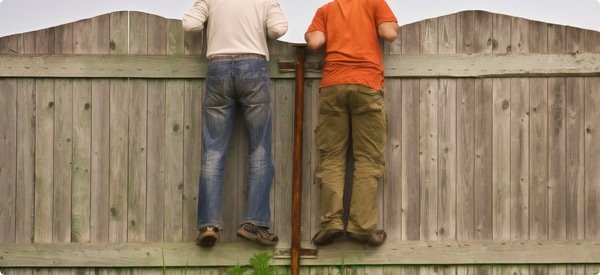|
Setback requirements of a fence installation represent how many feet the fence is "set back" from your actual property boundary. To establish whether or not your project meets the setback rules of your region, you need to get an estimate from a professional fence contractor. A local fence contractor will help you navigate the survey process, pointing you in the right direction. Working with your city or county’s zoning and local Miss Utility office you and your fence specialist can decide exactly where your fence will go on your property. |
Different locations usually have different laws. Be sure that you fully understand which rules are applicable to you. The best course of action is to get your official survey performed, go to the zoning department, find out where you can put your fence and select from the variety of fence options that meet your needs and your area's acceptable forms of fence structures. You may not need a permit for fences under six feet, but almost all fences built must follow the setback regulations. When searching, use this example: Fairfax County, Virginia |
 |
|
Depending on where you live, the height of your fence affects whether or not you need prior approval. When a city inspector measures a fence, they do so from the base of the fence posts to the top of the fence. If your project requires any kind of fence that is less than six feet tall, then you typically do not need to get a building permit nor do you need to get residential zoning approval. As a hypothetical, let's say some citizens in your community want to build a school, a ballpark, open a car repair shop in his garage, or a company may want to convert the gas station into a McDonald's in your quiet neighborhood. An official determination is measured by the weight given to the need within the area. Required promotion of the public health and safety of the community, best use of said land or property, and whether the land overall ls structurally sound enough to install a framed fence enclosure Knowing that the zoning is tailored to the community's needs and vision should give you, the existing property owner, peace of mind. |
s all of this actually necessary? While It might seem like a bit of an ordeal, a professionally installed and properly prepared fence project is worth its weight in property value,curb appeal and cost of repairs. Select a fence contractor that specializes in the kind of installs, accreditations even website site design. Pay attention to their reviews across Angie's list and other referrals both on and offline. Why do we need these fence and property regulations? In the interest of protecting the general welfare of your community, the zoning ordinance furthers the public good through regulations, assuring residents of the stability of the area. Zoning applicants are therefore required to demonstrate their proposed future location will not be incompatible with the best use of the locale and have a detrimental affect on the public welfare. |
|
Always be aware of the other regulations that affect your fence project. For example, if your fence is over eight feet tall, then it needs to be able to resist winds of certain speeds. Use your judgement, get your ducks in a row and take some time to think about what fence solution will not only give you the look and security you desire in consideration of your surroundings and your neighborhood. An experienced and qualified fence contractor will do the heavy lifting both literally and metaphorically. Your fence project deserves the utmost attention and you should be 100% happy about your investment. More on zoning: http://real-estate-law.freeadvice.com/real-estate law/zoning/zoning_hurt.htm#ixzz3aEi2ETF7 |


